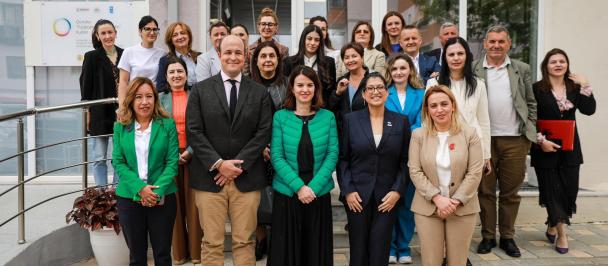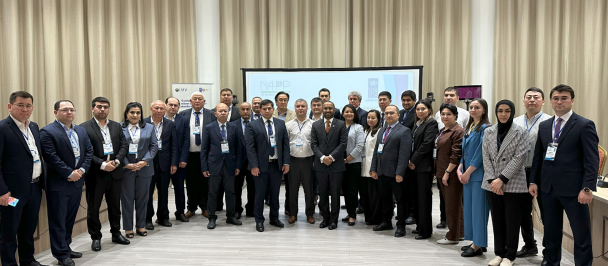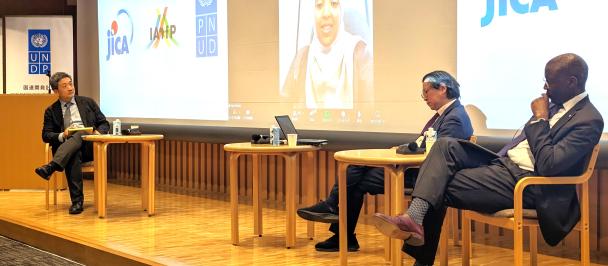UN Staff Submit Views on Marriage and Matrimonial Property Bills
August 16, 2022
Linda Nxumalo facilitating the session.
Although Eswatini adopted the 2005 Constitution whose bill of rights affords women and men an equal status, these rights have not been attainable because of outdated family laws. For example, the Marriage Act of 1964 maintains that the marriageable age is 16 years for women and 18 years for men, inconsistent with the Constitution which calls for equality before the law. The country is also using the Administration of Estate Act of 1902 which, for example, treats a woman in customary marriage as a minor as opposed to a partner to the deceased husband.
As a result, the Ministry of Justice and Constitutional Affairs is in the process of updating these family laws to be aligned with not only the Constitution but also with international instruments such as the UN Convention on the Elimination of all Forms of Discrimination Against Women (CEDAW) which the country adopted in 2004. Through technical support from UNDP, this process has culminated in the draft Marriages Bill 2022 and Matrimonial Property Bill 2022 which have both reached Parliament.
To finalise the process, Parliament through the Justice Portfolio Committee is engaging with members of the public to get their views on the draft legislation using different platforms. Besides accepting written submissions, the Portfolio Committee chaired by Kwaluseni Member of Parliament, Hon. Sibusiso Mabhanisi Dlamini, also visits different communities and centres to get input on the Bills.
On 12 August 2022, the Portfolio Committee in the company of the Law Review Commission under the Attorney General’s Office, the Master of the High Court Office and the Minister of Justice and Constitutional Affairs, Hon. Pholile Shakantu, visited the United Nations staff to get their contributions to the Bills. This meeting was convened by the United Nations Resident Coordinator, Mr. George Wachira, who commended UNDP, as the technical lead agency in the area of Governance, for supporting this process and for making it possible for the broader UN fraternity to participate in this important exercise.
“As you would know, we at the UN embrace both developmental and normative mandates. The latter, indeed, do and must underpin the former; sustainable development must rest on a firm basis of respect for recognised international norms of rights, equality, and inclusion. As the UN, we have a role in supporting Member States in domesticating international and regional instruments,” he said.
Mr. Wachira emphasised that any society that, in the 21st century, fails to recognise and treat women as equal to men is doomed to fail in all other endeavours. No long-term development aspirations can be achieved if half of our society is treated as second class.
“We, men, must constantly remind ourselves that we lose nothing, and there is much to be gained when we think differently about gender relations,” said Mr. Wachira.
Addressing the same meeting, UNDP Resident Representative, Ms. Rose Ssebatindira, expressed her gratitude to the Minister and the Portfolio Committee for making time for the UN staff to make their submissions.
“May I reiterate UNDP's commitment to supporting the last steps towards the enactment of these Bills. This difficult journey that started way back in 2015, we are confident that with your leadership Hon Minister, 2022 will be the year when it ends,” she said.
Ms. Ssebatindira said she did not doubt that given the motivation of the Portfolio Committee demonstrated this far, the Marriage and Matrimonial Property Bills will be one of the major deliverables for the 11th Parliament.
Minister Shakantu appreciated the support from UNDP and indicated that she was grateful for the opportunity to hear the submissions from UN Staff and mentioned that more Bills under the family laws are yet to be rolled out to fully comply with the Constitution especially given that they are complimentary of each other.
Summary of Staff Submissions
While the staff found some pieces of the Bills progressive and in the spirit of the Constitution and international treaties, they made the following submissions:
- While the Marriage Bill seeks to afford men and women equal status, the relevance of cultural practices such as polygamy may be outdated. Otherwise, the proposed Act should allow women to practise polyandry.
- While having the same marriageable age for both men and women is a positive step, 18 years is too young for a couple to have the financial means to sustain themselves.
- The Bill only recognises marriage between a man and a woman. How about the Lesbian Gay Bisexual Transgender Queer and Intersex community?
- There is a need to make a conscious effort to not only educate people on the progressive provisions once the Bill is enacted into law, but to also provide legal assistance, especially for those who cannot afford legal service.

 Locations
Locations



